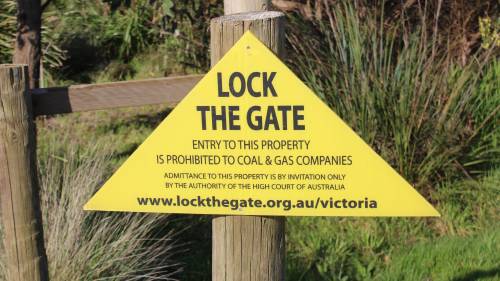THE Victorian Farmers Federation is calling on the State Government to maintain a ban on all exploration and extraction of onshore gas until at least 2020.
“We have precious groundwater reserves in Victoria, and our biggest fear is that onshore gas exploration could put those reserves at risk,” VFF Land Management Committee chairman Gerald Leach said.
“No-one knows the true environmental impact of onshore gas mining, so it would be crazy to lift the moratorium until there’s scientific evidence that the risks can be managed.”
A recent VFF survey showed the greatest concern of members was the potential for cross-contamination of aquifers as a result of drilling for gas, while others feared it would cause financial or environmental harm.
The VFF, in its submission to the State Government’s Unconventional Gas Inquiry last year, argued that all onshore gas exploration and extraction could have dire impacts on agriculture.
“The fact is you can’t eat gas,” Mr Leach said. “Agriculture is here for generations to come, whereas the gas industry is here today, gone tomorrow.”
“We need answers on the impacts of onshore gas on aquifers. Who monitors the wells after the gas reserves are exhausted – to ensure the concrete lining doesn’t crack and lead to saline aquifers cross-contaminating fresh ones?
“The VFF cannot support lifting the ban until farmers are convinced there are no risks to the state’s food and fibre production. We cannot put at risk Victoria’s status as the nation’s biggest food and fibre exporter ($11.6 billion in 2015) for the sake of some short-term gains from gas industry.
The State Government is due to hand down its decision on whether or not it will maintain the moratorium on onshore gas exploration and extraction during next week’s sitting of parliament.
The VFF expects the government to maintain the moratorium on both unconventional and conventional gas exploration and extraction in the interests of protecting our farming land and water.
As it stands the moratorium includes:
· A hold on granting new exploration licences for all types of onshore gas (tight, shale, coal seam and conventional gas)
· A hold on approvals for hydraulic fracturing
· A hold on exploration drilling activities
· A ban on the use of BTEX (benzene, toluene, ethylbenzene, xylene) chemicals, which has been enshrined in legislation
· Scientific studies to understand the possible impacts of a potential onshore gas industry on Victoria’s surface water and groundwater
Unconventional gas refers to an underground source of natural gas found in the layers of three types of rock structures (coal seams, tight rocks and shale rocks), which may be extracted by high pressure pumping of water, sand and sometimes chemicals into these structures to release the gas.
Conventional gas is an easier process that involves drilling directly into gas trapped in porous rocks.
Mr Leach said the government needed to think carefully about the potential impacts of both forms of gas development in making a decision on the moratorium.







